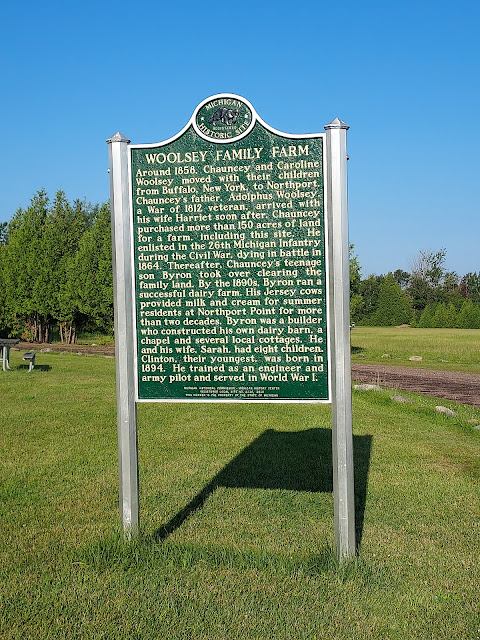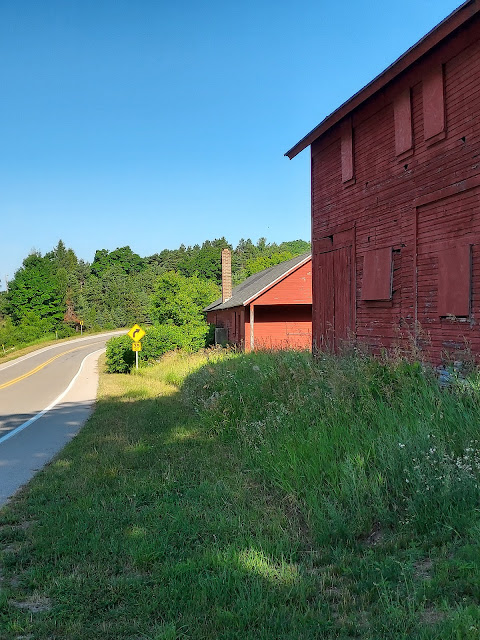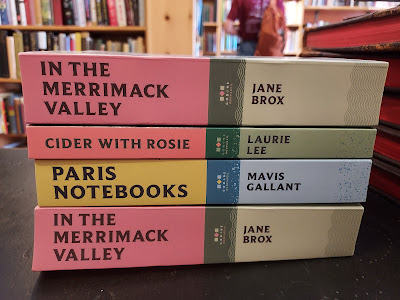 |
| Sandhill cranes return every year. |
Everyone wants to be here! Is that a problem?
Bear with me while I start far from Michigan....
Wilma Dykeman, in the volume of the “Rivers of America” series entitled The French Broad, which gives the history of a river region that encompassed western Tennessee and eastern North Carolina, writes in one chapter of a boom in tourism set off initially by “lowlanders” on the coast seeking to escape heat and malaria by summering in the mountains. At first conditions were rustic, but as time went on more and more elaborate hotels and resorts were built. The boom did not last forever—as transportation alternatives came along that allowed greater distances to be covered, the lowlanders were able to vacation much farther from home than Appalachia—but while it was on, it was definitely on, enticing foreigners from England, Scotland, and Germany as well as residents of North Carolina’s seacoast. In the 19th century, the region of the French Broad River saw “a mingling of Northern wealth and Southern abandon.”
Everyone, it seemed, wanted to be there.
It was the peak of the boom for the watering places in the French Broad country. To these springs and hotels came people who at a later date would be gasping over the canyon of the Yellowstone rather than the canyons of the French Broad. The ‘Lowlanders,’ who set out from their malarial flatlands with a caravan of carriages and trekked up through the foothills and into the mountains on a journey that cost at least two weeks every year, were looking for the same things many of the tourists who hurry through so rapidly today are seeking: A combination of comfort and ruggedness, the uneasy balance between a luxurious personal surrounding and an untamed natural background. They simultaneously sought new experiences yet managed to establish many of their old ways of life in the country they visited.
- The French Broad, by Wilma Dykeman, from the Rivers of America series, edited by Carl Carmer, as planned and started by Constance Lindsay Skinner
The French Broad was published in 1955, that post-World War II era when Americans began vacationing in automobiles, when motels began to replace earlier “tourist resort” campgrounds, but are Americans who leave home today, whether for two weeks or permanently, much different? Don't most still want new places to offer both comfort and ruggedness, nature and luxury, the excitement of new experiences along with the familiarity of their old ways of life?
My bookstore is in Leelanau County, Michigan, and these days it sometimes seems to locals as if everyone wants to be here. Or in Grand Traverse or Benzie County or Antrim or Charlevoix or – well, a bookseller friend in the U.P. feels as if everyone wants to live on her road! But the other side of the coin is that businesses rely on customers, whether locals or weekenders or new residents. Then, too, not all of us who live here were born here, by a long shot. I was born in South Dakota myself, of an Ohio-born father and a California-born mother!
***
 |
| Who wouldn't want to be here? |
[PLEASE NOTE: I was still reading the two books discussed below, i.e., had not finished either one, when I put this post out into the world, because I could not wait!]
Tim Mulherin’s This Magnetic Book: Candid Conversations on a Changing Northern Michigan explores the “relocation phenomenon” that is swelling the population of places like Traverse City. Northern Michigan, of course, is not the only destination of people fleeing crowds and climate disasters. Arizona and New Mexico and Idaho and Montana are all getting their share of well-to-do “climate refugees” from California. Some people are still moving to the South for warmer winters and sunshine, but others are moving away from the South.
Americans on the move! Pulled by magnetic forces away from home to new homes!
Mulherin begins with his own migration story, but then in Chapter 2 ups the ante seriously with “An Indigenous Perspective,” interviewing several members of the Grand Traverse Band, whose people were here long before Europeans “discovered” North America. In fact, a list of chapters will tell you a lot about the scope of Tim’s book:
Chapter 1. “A Migration Story”
Chapter 2. “Indigenous Perspectives”
Chapter 3. “Welcome Wagon”
Chapter 4. “Settlers”
Chapter 5. “A Taste of Northern Michigan”
Chapter 6. “Invasive Species”
Chapter 7. “America’s Most Beautiful Place”
Chapter 8. “Protecting Paradise”
Chapter 9. “Eyes to the Sky”
Chapteer 10. “Every Day is Earth Day”
Mulherin interviewed over 75 Northerners from various walks of life and a multitude of backgrounds. Pandemic & climate refugees or lifestyle migrants? Which label fits better as you see it? If you came here from downstate or farther away, does either label seem to fit your move to Leelanau or the greater Grand Traverse area? If you’ve lived here all your life, how do you view newcomers and change?
One fruit grower Mulherin interviews points out that the very places seen as most desirable for new houses are also the most advantageous locations for orchards.
Growing specialty fruit crops in northern Michigan calls for being close to Lake Michigan, within several miles, and on sloping ground. This, of course, also makes for perfect view property. ‘Our desirable fruit-growing land is getting turned into golf courses and subdivisions and wonderful view mansions that can see Grand Traverse Bay,’ King McAvoy explains with a tinge of cynicism.
The lake offers protection, cooling the land in summer and keeping it warmer in winter, but property prices keep going up, while farming remains a gamble from year to year.
Mulherin, who still maintains a home in Indiana, does not presume to have answers or give prescriptions, but it’s clear that no one he talked to wants change and growth to destroy what makes this part of the country such a magnet for vacationers and relocators alike. Unfortunately, where some see destruction, others see improvement.
I admit that part of my pleasure in reading Mulherin's book is encountering so many old friends, but anyone who loves our area and cares about its future will want to read This Magnetic North.
***
Now, can work be a vacation? Maybe that depends on where you are.
When Robert “Carlos” Fuentes introduced himself and his book to me recently, my enthusiasm was immediate. The Vacation: A Teenage Migrant Farmworker’s Experience Picking Cherries in Michigan is a personal account of what it was like to work in a Leelanau cherry orchard a few decades ago. Robert’s family were not year-round farm workers—his father had a floor cleaning business—but the summer he was 14 Robert was told by his father that the family was going to Lake Leelanau for vacation. The only catch was that they would be picking cherries from 8 a.m. to 5 p.m. on weekdays and for a few hours on Saturday mornings.
The day before they left home, when Robert tells his friend Luis that he’s going to Lake Leelanau for a cherry-picking vacation, Luis scoffs at the idea of picking cherries as a “vacation.”
He tells me it is hard, dirty, thankless, and physically strenuous work. His family is still partly in the migrant farmworker stream. All Mexican American families in our neighborhood were from Texas and came to Michigan as migrant farmworkers. Luis tells me that he and his family have already done two weeks of hoeing at some local fields and will soon be heading up north to pick cherries at a farm on Old Mission Peninsula.
Robert was grateful he didn’t have to move around the country harvesting different crops. He liked having a settled home in Alma, Michigan. But he was excited about the “vacation” his father had planned for the family on the Esch Farm in Leelanau County, where his grandfather had first come (from Texas) to pick cherries in 1946 and, in later summers, had led church services in Spanish in the barn for the migrant workers.
Before mechanical shakers came along, cherries, like apples, were picked by hand. The author writes in his brief introduction that when machines came to the orchard,
…the backbreaking tradition of handpicking gave way to mechanized efficiency. In a matter of years, the thousands of workers who had once filled the orchards, their laughter and voices rising with the rustling leaves, were no longer needed. A way of life was disappearing.
With these few, spare introductory lines, Fuentes reminds us that change is nothing new in northern Michigan.
Robert’s cherry-picking vacation was in 1969, just a year before I moved to Traverse City from Lansing, and I remember the era well: “muscle” cars, Wolfman Jack, the miniature model Traverse City and the zoo in Clinch Park. I don’t remember ice cream at NJ’s. The Twister for ice cream (where Fiddleheads is now) must have come along much later.
But whether you knew the area in 1969 or not, the author will take you back in time, as he seamlessly weaves facts about the cherry industry with personal experience (Robert could pick enough to fill an average of 22 lugs in eight and a half hours; the best pickers could fill 25-30 lugs a day but worked longer hours; growers were paying 80 cents a lug in 1969; and growers were paid by the pound, varying from seven to 15 cents in those days), and his story includes not only facts and sights but also sounds and tastes and smells of those days, as well as descriptions of his own thoughts and moods.

As we read, we hear the whine of mosquitoes and the strains of Tejano music from car and truck radios, taste a special lakeside supper of grilled hot dogs with catsup and mustard (a change from the family’s customary and probably more delicious Mexican fare), smell the Zest soap in the cold shower, and see the roadside daylilies that catch Robert’s eye. He is nervous about talking to a girl he finds attractive, but when she smiles at him all the world is bright.

On a typical day, he and his siblings would have cereal for breakfast, pick fruit until stopping for a half-hour picnic lunch, pick again until quitting time, and then enjoy a trip to a Lake Leelanau beach for another picnic meal, maybe later to NJ’s for ice cream, winding up, for Robert, with an evening gathering of teen boys in their “clubhouse” in the barn, where they would trade baseball cards and have farting contests, which he acknowledges was totally a guy thing. Outside the clubhouse, however, his sensitive nature responded to northern Michigan.
Walking back to the tent through dew-covered grass, I take in my surroundings. I gaze at the sky, marveling at the stars and planets. The wind rustles the leaves, their sound blending with the chorus of crickets and katydids…. This place feels so peaceful right now….
***
I am reading Mulherin and Fuentes almost simultaneously--toggling back and forth between them, that is. I’m enjoying the experience, immersed in how life was then compared to how it is now in the same region, and I recommend you do the same.
The big question is, of course, what do we want this part of Michigan to be in the future, and what can we do about it? Your thoughts?
P.S. Current summer bookstore hours here.










































